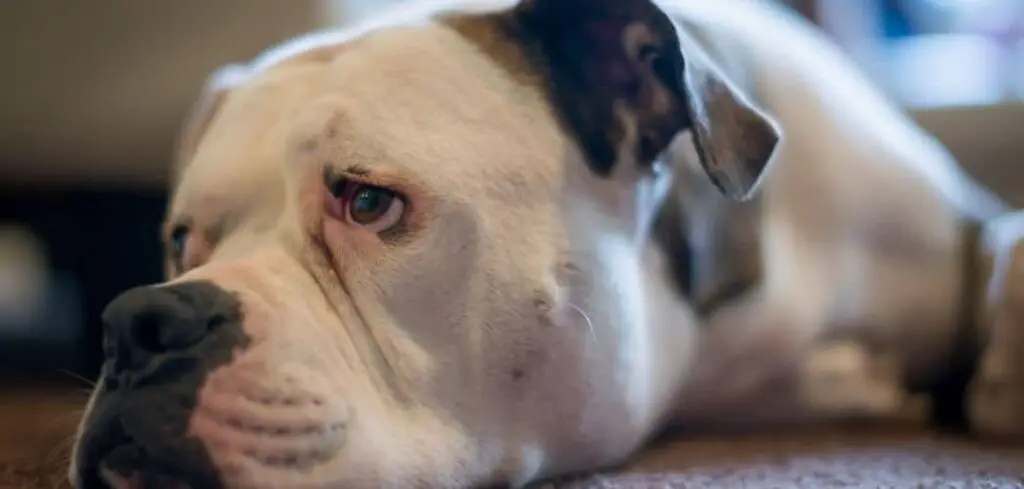If your dog suddenly has diarrhea and is also peeing in the house, it’s a red flag that something isn’t right. These symptoms may point to an underlying medical issue, emotional distress, or behavioral problem that needs attention.
We outline the common causes of dog diarrhea and peeing in the house, what you can do at home, and when to seek veterinary help.
Here’s why dog diarrhea and peeing in the house occurs
Dog diarrhea and peeing in the house can occur together due to a number of illnesses that cause these symptoms which include gastrointestinal infections, diet, food allergies, medication side effects, illness, stress, poisoning, age-related issues and behavioral problems.
In senior dogs, cognitive dysfunction or organ disease may be to blame. In younger dogs, infections or dietary issues are often culprits. Hormonal imbalances and behavioral factors can also lead to accidents indoors.

Common Causes of Dog Diarrhea and Peeing in the House
Urinary Tract Infection (UTI)
A UTI can cause frequent, urgent urination, leading to accidents in the house. If your dog is straining to pee or you notice blood in the urine, a UTI is likely. This discomfort can also contribute to anxiety and gastrointestinal upset, resulting in diarrhea.
Dogs with UTIs may pace, lick their genital area excessively, or cry when urinating. Left untreated, UTIs can ascend to the kidneys and cause more serious illness.
Related: Dog diarrhea and blood in urine (Explained)
Gastrointestinal Infection or Parasites
Bacterial or viral infections, or intestinal parasites like Giardia and worms, often cause sudden diarrhea. Your dog may lose control indoors if they can’t make it outside in time.
These infections can make your dog feel sick overall, potentially affecting their normal behavior—including urination patterns. Loose stools combined with house soiling point to digestive distress needing treatment.
Stress and Anxiety
Changes in the household, such as a new pet, move, or loud noises, can trigger stress-related diarrhea and inappropriate urination.
Stress disrupts normal digestion and may also cause your dog to regress in housetraining. Anxiety-prone dogs may pace, pant, and have multiple accidents even if they were previously well-trained.
Cognitive Dysfunction Syndrome (CDS)
Older dogs may experience memory loss and confusion, leading to house soiling. CDS, similar to dementia in humans, affects both bowel and bladder control.
A dog with CDS may forget where to go potty or be unable to hold it until they get outside. Diarrhea in these cases may also be linked to dietary changes or medications.
Endocrine Disorders
Dogs with diabetes often drink and urinate more, and may not make it outside in time. Cushing’s disease can have similar effects due to increased thirst and urination.
Both conditions can also cause gastrointestinal upset. Uncontrolled diabetes can lead to diarrhea due to blood sugar fluctuations. These chronic illnesses require veterinary management.
Dietary Indiscretion or Food Sensitivity
Eating table scraps, garbage, or unfamiliar foods can irritate your dog’s stomach and lead to diarrhea. The urgency may be so great that your dog can’t make it outside.
Sometimes, the stress of a stomach upset may also disrupt normal urination habits. Pay attention to any recent changes in diet, treats, or access to unsafe foods.
What to Do If Your Dog Is Having Diarrhea and Peeing in the House
Start by limiting food intake for 12–24 hours (but keep water available) if the diarrhea just began and your dog seems otherwise normal. Offer a bland diet of boiled chicken and rice for a couple of days to ease digestion.
Clean all accident areas thoroughly using an enzymatic cleaner to prevent repeated indoor marking. Avoid punishment—it will only increase stress and potentially worsen the problem.
Maintain a consistent potty routine, and offer more frequent bathroom breaks if possible. Keep a log of your dog’s symptoms, including stool consistency and urination patterns, to help your vet with diagnosis.
If stress seems to be a trigger, identify and reduce the source if possible. Comfort your dog with calm routines and consider anti-anxiety products like pheromone diffusers or supplements.
For chronic issues or repeated episodes, consult your veterinarian. Tests may be needed to identify infections, parasites, or other medical conditions.
When to Call or Visit Your Vet
Call your vet if your dog:
Has diarrhea lasting more than 24–48 hours
Is peeing in the house frequently or cannot control urination
Shows signs of pain, lethargy, vomiting, or fever
Has blood in the stool or urine
Is a puppy, senior, or has a pre-existing medical condition
These signs could indicate a more serious condition like kidney disease, pancreatitis, or a systemic infection. Early veterinary care can prevent complications and help your dog recover quickly.
Read more: Dog Diarrhea and Not Eating (Why your dog might be refusing food)
Key Takeaway
Diarrhea and house soiling can be distressing for both you and your dog. Whether the cause is medical, behavioral, or age-related, prompt attention and consistent care are essential.
Monitor your dog closely, provide gentle support, and contact your veterinarian if symptoms persist. With the right approach, your dog can get back to normal bathroom habits—and comfort—soon.
